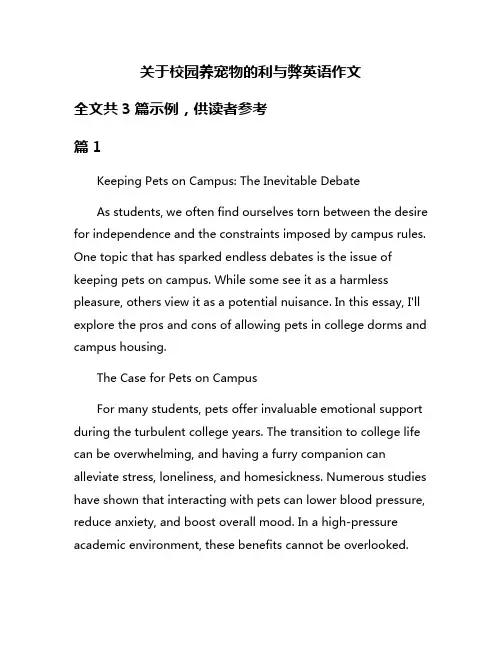养宠物带来的改变高中英语作文范文
- 格式:docx
- 大小:15.95 KB
- 文档页数:2

养宠物的优势英语作文英文回答:Benefits of Pet Ownership.Pets play an integral role in enriching our lives, offering companionship, emotional support, and numerous health benefits. Here are some of the compelling advantages of pet ownership:1. Companionship and Love:Pets provide unconditional love and companionship, filling our homes with unwavering affection. They offer a sense of purpose and belonging, especially for those living alone or lacking social connections. Studies have shownthat owning a pet can reduce feelings of loneliness and isolation, promoting mental well-being.2. Emotional Support:Pets have a remarkable ability to sense our emotions and provide comfort during stressful times. Their presence can alleviate anxiety, depression, and feelings of sadness. Interacting with pets releases hormones such as oxytocin, which have calming and bonding effects.3. Physical Activity:Dogs, in particular, require regular exercise, which can encourage their owners to engage in more physical activity. Walking, running, or playing with pets promotes cardiovascular health, weight management, and reduces the risk of chronic diseases.4. Heart Health:Studies have linked pet ownership to lower blood pressure and cholesterol levels. The calming presence of pets can reduce stress, which is a major risk factor for heart disease. Additionally, pets can provide motivationfor physical activity, which further benefits heart health.5. Cognitive Stimulation:Interacting with pets requires cognitive stimulation, such as training, playing games, and solving puzzles. This mental exercise can help keep the mind sharp and reduce the risk of cognitive decline in older adults.6. Socialization:Pets can facilitate social interaction by providing a common topic of conversation with neighbors, friends, and strangers. Dog owners often connect with fellow dog ownersat parks or dog-friendly events, fostering community connections.7. Responsibility and Education:Caring for a pet teaches children responsibility and empathy. They learn the importance of providing food, water, shelter, and affection. Pets can also be used as teaching tools, helping children understand the life cycle,ecosystems, and the importance of animal welfare.8. Reduced Stress and Anxiety:The presence of a pet has been shown to calm thenervous system and reduce stress levels. Studies have demonstrated that petting a dog or cat can lower blood pressure and slow the heart rate.9. Increased Happiness:Pets can elevate our mood and promote overall happiness. Their playful antics, affectionate nature, andunconditional love can bring joy and laughter into our lives. Interacting with pets has been linked to the release of serotonin, a neurotransmitter associated with happiness and well-being.10. Healthier Immune System:Exposure to pets early in life has been associated with a stronger immune system. Children who grow up with petsare less likely to develop allergies and respiratory infections. Pets can also help reduce the risk of certain autoimmune diseases.中文回答:养宠物的好处。

养宠物利弊的英语作文As more and more people are keeping pets, it has become a heated topic whether keeping pets is beneficial or not.In my opinion, keeping pets has both advantages and disadvantages.On the one hand, keeping pets can bring us many benefits. Firstly, pets can provide us with companionship. They are always there for us when we need them, and theycan help us reduce stress and loneliness. Secondly, petscan help us improve our physical health. Walking a dog or playing with a cat can help us exercise and stay active. Thirdly, pets can teach us responsibility and empathy. We need to take care of them and provide them with food, water, and shelter, which can help us develop a sense of responsibility. Moreover, taking care of pets can help us develop empathy and compassion for other living beings.On the other hand, keeping pets also has some drawbacks. Firstly, pets require a lot of time and attention. We needto feed them, clean up after them, and take them for walks. This can be time-consuming and may interfere with our workor other activities. Secondly, pets can be expensive. We need to buy food, toys, and other supplies for them, and we may also need to pay for veterinary care if they get sickor injured. Thirdly, pets can cause problems for peoplewith allergies or asthma. Some people may be allergic topet dander or saliva, which can cause them to have allergic reactions.In conclusion, keeping pets has both advantages and disadvantages. While pets can provide us with companionship, improve our physical health, and teach us responsibilityand empathy, they also require a lot of time and attention, can be expensive, and may cause problems for people with allergies or asthma. Therefore, before deciding to keep a pet, we need to carefully consider both the benefits and drawbacks and make an informed decision.。

关于校园养宠物的利与弊英语作文全文共3篇示例,供读者参考篇1Keeping Pets on Campus: The Inevitable DebateAs students, we often find ourselves torn between the desire for independence and the constraints imposed by campus rules. One topic that has sparked endless debates is the issue of keeping pets on campus. While some see it as a harmless pleasure, others view it as a potential nuisance. In this essay, I'll explore the pros and cons of allowing pets in college dorms and campus housing.The Case for Pets on CampusFor many students, pets offer invaluable emotional support during the turbulent college years. The transition to college life can be overwhelming, and having a furry companion can alleviate stress, loneliness, and homesickness. Numerous studies have shown that interacting with pets can lower blood pressure, reduce anxiety, and boost overall mood. In a high-pressure academic environment, these benefits cannot be overlooked.Additionally, caring for a pet can teach valuable life skills, such as responsibility, time management, and empathy. Students who care for pets learn to prioritize their needs, adhere to schedules, and develop a nurturing mindset. These qualities can translate into better academic performance and personal growth.For some students, particularly those with disabilities or mental health challenges, pets serve as emotional support animals, providing comfort and stability. Denying these individuals the right to keep their support pets on campus could be seen as discriminatory and insensitive to their needs.The Case Against Pets on CampusWhile the benefits of pet ownership are undeniable, there are valid concerns about allowing pets on campus. One of the primary arguments against this practice is the potential for disturbances and disruptions. Barking dogs, meowing cats, and other pet-related noises can be a nuisance to students trying to study or sleep. Additionally, some individuals may have allergies or phobias that could be exacerbated by the presence of certain animals.Concerns also arise regarding the proper care and maintenance of pets in a campus setting. Irresponsible petowners may neglect to clean up after their animals, leading to unsanitary living conditions and potential health hazards. Furthermore, cramped dorm rooms or apartments may not provide adequate space for some pets, resulting in animal welfare issues.Another significant concern is the potential for damage to campus property. Pets can inadvertently scratch floors, chew furniture, or soil carpets, leading to costly repairs and replacements. This financial burden may ultimately be passed on to all students in the form of higher housing fees or tuition costs.Finding a BalanceGiven the valid arguments on both sides of this issue, it is clear that a balanced approach is necessary. One potential solution could be to designate specific pet-friendly housing options on campus. This would allow students who desire to keep pets to do so while ensuring that those who prefer pet-free living spaces are accommodated.Additionally, strict guidelines and regulations should be implemented to ensure responsible pet ownership. These could include strict cleaning and noise policies, mandatory pet registration and vaccinations, and size or breed restrictions forcertain animals. Violators of these policies could face fines or the revocation of their pet-keeping privileges.Ultimately, the decision to allow pets on campus should be made with input from students, faculty, and campus administrators. Surveys and open forums could be conducted to gauge the overall sentiment and identify potential concerns or solutions. By fostering an open dialogue and seeking compromise, a policy can be developed that meets the needs of the entire campus community.ConclusionThe debate over keeping pets on campus is a complex one, with valid arguments on both sides. While pets can provide invaluable emotional support and teach valuable life skills, concerns over disturbances, allergies, and potential property damage cannot be ignored. By implementing pet-friendly housing options, strict guidelines, and open communication, colleges and universities can strike a balance that accommodates the diverse needs and preferences of their student populations.As students, we must approach this issue with empathy and understanding. For some, a pet may be a cherished companion and source of comfort; for others, it may be an unwelcome distraction or health concern. By fostering an environment ofmutual respect and compromise, we can create campus communities where both pet owners and non-pet owners can coexist harmoniously.篇2Keeping Pets on Campus: The Furry DebateAs a college student, life on campus can be stressful with endless classes, assignments, and exams. In the midst of this chaos, many students find solace and comfort in the companionship of a furry friend – a beloved pet. However, the topic of allowing pets on campus is a contentious one, with valid arguments on both sides. In this essay, I will explore the potential benefits and drawbacks of permitting students to keep pets in their dorms or campus housing.On the plus side, having a pet can provide numerous psychological and emotional benefits for students. College can be an incredibly lonely and isolating experience, especially for freshmen who are adjusting to life away from home for the first time. A pet can offer unconditional love, companionship, and a sense of purpose, which can be invaluable in combating feelings of loneliness and homesickness. Additionally, numerous studies have shown that interacting with animals can reduce stress,anxiety, and depression – issues that are all too common among college students.Caring for a pet can also teach valuable life skills, such as responsibility, time management, and empathy. Students with pets must learn to balance their academic commitments with the demands of caring for a living creature, which can be excellent preparation for the responsibilities of adult life. Furthermore, the bond between a person and their pet is incredibly special, and having a furry friend to come home to after a long day of classes can be a much-needed source of comfort and joy.From a physical health perspective, pets can encourage students to stay active and get outside for regular walks or playtime. This can be particularly beneficial in combating the infamous "Freshman 15" weight gain that many students experience due to the combination of stress, poor eating habits, and lack of exercise. Additionally, some studies have suggested that exposure to certain pets can boost the immune system and reduce allergies in children, which could potentially extend to college-aged individuals as well.Despite these potential benefits, there are also valid concerns about allowing pets on campus. One major issue is the potential for noise disturbances and disruptions caused bybarking dogs or other vocal pets. This can be a significant problem in close-quarters living situations like dorms or apartment buildings, where noise can easily travel and disturb other students who are trying to study or sleep.Another concern is the risk of allergies and potential health hazards posed by pet dander, fur, and waste. While some students may benefit from exposure to pets, others with severe allergies or asthma could experience serious reactions or even life-threatening complications. Proper cleaning and maintenance would be essential to mitigate these risks, but it could be challenging to enforce strict hygiene standards across an entire campus.Additionally, there is the issue of animal neglect or abandonment. College students often have unpredictable schedules and may find themselves overwhelmed with coursework or extracurricular activities, leaving little time or energy to properly care for a pet. This could lead to cases of animals being neglected, mistreated, or even abandoned when students move out or graduate.Lastly, there are practical considerations, such as the potential for property damage caused by pets scratching furniture, chewing on belongings, or having accidents indoors.This could lead to costly repairs or fines for students, as well as disputes between roommates or neighbors over whose pet is responsible for the damage.In my opinion, while there are valid concerns about allowing pets on campus, the potential benefits outweigh the drawbacks –provided that proper precautions and regulations are in place. Perhaps a compromise could be reached, such as designating certain dorms or housing areas as "pet-friendly" zones, while keeping other areas pet-free to accommodate those with allergies or preferences for a pet-free environment.Additionally, strict guidelines and requirements could be implemented for students wishing to have pets on campus. This could include mandatory pet registration, proof of up-to-date vaccinations and veterinary care, and potentially even pet ownership classes or counseling to ensure that students understand the responsibilities involved. Deposits or fees could be collected to cover potential cleaning or damage costs, and clear policies could be established for dealing with noise complaints, animal neglect, or other issues that may arise.Ultimately, the decision to allow pets on campus is a complex one that requires careful consideration of various factors. However, as a student who has experienced the immensejoy and comfort of having a furry companion by my side during the challenges of college life, I believe that permitting pets on campus – with appropriate regulations and oversight – could be a positive and enriching experience for many students. After all, our four-legged friends have a way of bringing out the best in us and reminding us of the simple joys in life, even amidst the chaos of higher education.篇3Having Pets on Campus: The Perks and ProblemsHey there! As a college student living on campus, the idea of having a furry companion by my side has definitely crossed my mind more than once. Don't get me wrong, I love the independence of dorm life, but sometimes it gets pretty lonely in my little shoebox room. Having a pet around could be the perfect antidote to those college blues, right? But it's not quite that simple. Like most things in life, keeping pets on campus comes with its own set of perks and problems that are worth considering.Let's start with the good stuff – the perks of being a pet parent in college. For many of us students, our pets back home were our best friends growing up. They were our trustycompanions, our loyal sidekicks, and our source of unconditional love and support. Having that same sort of bond on campus could be a total game-changer, especially when we're feeling overwhelmed by classes, activities, and social pressures. Just think about coming back to your dorm after a rough day, and instead of being greeted by four walls, you've got an excited ball of fur waiting to shower you with affection. Talk about an instant mood-booster!Pets have also been proven to reduce stress and anxiety levels, which is hugely beneficial for us students juggling a million things at once. Simply petting a dog or cat can lower your blood pressure and release happy hormones like oxytocin and serotonin. With all the late nights, tough exams, and looming deadlines we face, having a pet around could be like having a built-in therapist – one that's always ready to lend an open ear (or paw) and some much-needed snuggles.Another major perk? Pets can help us stay active and socialize more, which are two things that can easily fall by the wayside in college. Having to take your dog out for daily walks or playtime is the perfect excuse to get some fresh air and exercise – a welcome break from hunching over textbooks and laptop screens. Plus, having a pet is an instant icebreaker andconversation starter. You'd be surprised how many new friends and connections you can make just by virtue of being the one with the adorable puppy on campus.But as amazing as all that sounds, we can't ignore the potential problems and pitfalls that come with having pets in dorms and campus housing. For one, the reality is that most of us students don't have tons of free time or money to properly care for a pet. Between classes, studying, extracurriculars,part-time jobs, and trying to have some semblance of a social life, it can be really tough to give a pet the attention, exercise, and care it needs – especially if you have a high-energy breed like a husky or retriever. And let's be real, vet bills and pet supplies aren't exactly cheap, which can stretch an already-tight student budget even thinner.Then there are the living situation logistics to consider. Most dorms have strict rules about pets, and those that do allow them usually have plenty of restrictions – like only permitting small animals, requiring hefty fees and deposits, and limiting pet owners to certain buildings or floors. That makes findingpet-friendly housing pretty limited and competitive. Even if you do manage to snag a pet-approved spot, there's always the risk of your furry friend becoming a nuisance to neighbors withallergies, noise complaints, or concerns about cleanliness and damages in shared spaces.At the end of the day, having a pet on campus is a big responsibility – one that a lot of students might not be prepared to take on, at least not in those crucial first years of college when we're still just trying to figure out how to survive on our own. As nice as it would be to have that constant source of comfort and companionship, the sad truth is that pets require lots of time, energy, money, and commitment that many of us just don't have to spare right now.That's not to say it can never work out though. If you're a more non-traditional or upperclassman student with a bit more flexibility and stability in your living situation, having a pet could be incredibly rewarding. And even for those of us who have to wait, there are still ways to get your pet fix through volunteering at shelters, puppy-cuddling events, or just befriending all the dog-owners in your neighborhood. We're only in college for a few years after all, and our furry soulmates will be waiting for us right when we get that degree.So while having a pet in college certainly comes with its advantages, it's not a decision that any student should take lightly. It's a big commitment that requires careful thought aboutyour lifestyle, responsibilities, and living situation. If you can swing it, then having a pet by your side could make your college experience that much richer and more fulfilling. But if not, there's no need to feel too ruffled about it. Just focus on getting through these few years as best you can, and your very own fur baby will be joining you in that next chapter of life soon enough.。

养宠物的好处和坏处英语作文Pets have been an integral part of human society for centuries, bringing joy and companionship to many households. Here is a composition on the benefits and drawbacks of owning pets:The Pros and Cons of Pet OwnershipOwning a pet can be a rewarding experience, but it also comes with its own set of responsibilities and challenges. Here are some of the advantages and disadvantages of having a pet:Benefits of Owning Pets:1. Companionship: Pets provide unconditional love and companionship, which can be particularly beneficial for individuals living alone or for the elderly.2. Stress Relief: Interacting with pets has been shown to reduce stress and anxiety. The simple act of petting a dog or cat can lower blood pressure and release endorphins, the body's natural mood elevators.3. Encourages Physical Activity: Pets, especially dogs, require regular exercise. This can encourage owners to be more active, promoting a healthier lifestyle.4. Social Interaction: Pets can be a great conversationstarter and can help pet owners meet new people and formsocial bonds.5. Teaches Responsibility: Caring for a pet teaches responsibility and can be a valuable life lesson for children, helping them learn about empathy and nurturing.Drawbacks of Pet Ownership:1. Cost: Pets can be expensive to maintain. Food, grooming, veterinary care, and other expenses can add up quickly.2. Time Commitment: Pets require time and attention. Theyneed to be fed, exercised, and given plenty of love and care.3. Allergies: Some people are allergic to pet dander, which can make living with a pet difficult or impossible.4. Damage to Property: Pets can sometimes cause damage to furniture, carpets, and other household items, especially during their training phase.5. Travel Limitations: Owning a pet can limit your ability to travel freely, as you will need to arrange for their carewhile you are away.Conclusion:While the decision to own a pet should be carefullyconsidered, the benefits of pet ownership can greatly outweigh the drawbacks for many people. Pets can bring joy, teach valuable life lessons, and provide a sense of purpose. However, it is important to be prepared for the financial and time commitments that come with pet ownership and to ensure that you can provide a safe and loving home for your pet.This composition provides a balanced view of the joys and responsibilities associated with pet ownership, encouraging thoughtful consideration before deciding to bring a pet into your home.。

高中生英语作文宠物对生活的影响Pets' Impact on Our LivesIn recent years, keeping pets has become an increasingly popular trend among people of all ages.Pets, such as dogs, cats, birds, and fish, have a significant impact on our daily lives.They not only provide us with companionship but also offer various health and emotional benefits.In this essay, we will explore the positive effects of pets on our lives.Firstly, pets can improve our physical health.Walking, playing, and exercising with pets can encourage us to engage in more physical activities.For example, owning a dog requires regular walks, which can help us achieve our daily exercise goals.Additionally, spending time with pets has been shown to lower stress levels and reduce blood pressure.The unconditional love and affection that pets provide can create a sense of security and well-being, promoting a healthier lifestyle.Furthermore, pets can have a profound impact on our emotional well-being.They serve as a source of constant companionship and can provide comfort during difficult times.Many studies have shown that owning a pet can reduce feelings of loneliness and depression.Pets offer unwavering support and can be a great source of motivation for individuals dealing with mental health issues.Their presence alone can bring joy and happiness to our lives.Moreover, pets can also teach us valuable life lessons.Responsibility,empathy, and patience are some of the qualities that can be learned from caring for pets.For instance, feeding, exercising, and grooming pets require a significant amount of time and effort.This responsibility teaches individuals, especially children, the importance of commitment and dedication.Furthermore, pets can teach us compassion and empathy as they rely on us for their well-being.Caring for pets can help develop a sense of empathy and understanding towards others.In conclusion, pets have a profound impact on our lives.They improve our physical health, enhance our emotional well-being, and teach us valuable life lessons.The love and companionship that pets provide are invaluable.As more and more people choose to bring pets into their homes, it is crucial to remember the responsibilities that come with it.Caring for pets requires time, effort, and dedication.However, the benefits that pets bring to our lives are well worth it.So, whether it's a furry dog, a fluffy cat, a playful bird, or a graceful fish, pets can undoubtedly enrich our lives in numerous ways.。

养宠物的优势英语作文英文回答:Benefits of Pet Ownership.Pets have become increasingly popular companions in households around the world, and for good reason. Owning a pet can provide numerous physical, mental, and emotional benefits to individuals and families alike.Physical Benefits.Pets can encourage physical activity. Dog owners, for instance, are more likely to engage in regular walks or runs, which can improve cardiovascular health and reduce the risk of obesity. Studies have also shown that petting animals can lower blood pressure and heart rate, reducing stress levels and promoting relaxation.Mental Benefits.Pets can provide companionship and reduce loneliness. For those living alone, having a pet can offer a sense of purpose and belonging. Pets can also stimulate cognitive function in older adults, helping to prevent memory loss and dementia.Emotional Benefits.Pets can provide unconditional love and support. They offer a non-judgmental presence and can help reduce stress and anxiety. Studies have shown that interacting with animals can release oxytocin, a hormone associated with happiness and bonding. Pets can also provide comfort during difficult times, such as bereavement or illness.Social Benefits.Owning a pet can facilitate social interaction. Dog parks, obedience classes, and other pet-related activities provide opportunities for pet owners to meet and connect with others who share their interests. Pets can also be aconversation starter, helping to break the ice in social situations.Other Benefits.Pets can have other benefits as well:Increased responsibility: Caring for a pet can teach children responsibility and empathy.Improved air quality: Some pets, such as cats, can help reduce allergens in the home.Reduced crime: Studies have shown that the presence of pets in a neighborhood can deter crime.Conclusion.Owning a pet can bring a wealth of benefits to individuals and families. From improving physical health to reducing stress and providing companionship, pets can enhance our lives in numerous ways. Before bringing a petinto your home, it's important to carefully consider your lifestyle, finances, and time commitments to ensure that you can provide the proper care and environment for your furry friend.中文回答:养宠物的优势。

养宠物主题英语作文Keeping PetsPets are becoming more and more popular in our daily life. A lot of people keep pets for various reasons.Having a pet can bring us joy and companionship. For example, dogs are loyal and always ready to play with us. They can make us feel loved and needed. Cats, on the other hand, are gentle and independent. They can give us a sense of peace when we watch them sleep peacefully.Pets can also teach us responsibility. When we have a pet, we need to take care of it, feed it, and clean up after it. This helps us learn to be responsible for another living being. However, keeping a pet also has some challenges. It costs money to buy food and take the pet to the vet for check-ups. Some pets may cause damage to the house or make noise that bothers neighbors.In conclusion, having a pet can be a wonderful experience, but it also requires our commitment and effort.译文:养宠物在我们的日常生活中,宠物变得越来越受欢迎。

关于养宠物的英语作文The Benefits of Keeping Pets。
Keeping pets has become a popular trend in modern society. There are various kinds of pets, such as dogs, cats, fish, birds, and so on. People keep pets for various reasons. Some people keep pets for companionship, while others keep pets for security o r even for their children’s education. In my opinion, keeping pets can bring many benefits to people.First and foremost, pets can provide companionship and emotional support to their owners. For example, when people are feeling lonely, they can talk to their pets and share their feelings with them. Pets are good listeners and they can make their owners feel better. In addition, pets can also help people reduce stress and anxiety. Studies have shown that spending time with pets can lower blood pressure and reduce the risk of heart disease. Therefore, keeping pets can have a positive impact on people’s mental andphysical health.Moreover, keeping pets can help children learn about responsibility and empathy. When children have pets, they need to take care of them by feeding them, cleaning them, and taking them for walks. This can help children develop a sense of responsibility and learn how to take care of others. In addition, pets can also teach children about empathy and compassion. When children see their petsfeeling sad or in pain, they will learn to empathize with them and try to comfort them. This can help children become more compassionate and caring individuals.Furthermore, pets can also help people build social connections. For example, when people take their pets for a walk in the park, they can meet other pet owners and have conversations with them. This can help people make new friends and expand their social network. In addition, pets can also help people overcome shyness and improve their communication skills. When people have pets, they need to communicate with them and understand their needs. This can help people become better communicators and develop bettersocial skills.In conclusion, keeping pets can bring many benefits to people. Pets can provide companionship and emotional support, help children learn about responsibility and empathy, and help people build social connections. Therefore, I believe that keeping pets is a great way to improve people’s quality of life. If you don’t have a pet yet, I highly recommend that you consider getting one. You will be amazed at how much joy and happiness a pet can bring to your life.。

Keeping pets is a delightful activity that many people enjoy for a variety of reasons. Pets, such as dogs, cats, birds, and even exotic animals, can bring joy, companionship, and numerous health benefits into our lives.First and foremost, pets provide unconditional love and companionship. They are always there to greet you with enthusiasm when you come home, offering a comforting presence that can alleviate feelings of loneliness and isolation. This emotional support is especially important for individuals living alone or those who may be struggling with mental health issues.Secondly, pets can significantly contribute to physical health. Owning a dog, for example, often encourages owners to engage in regular physical activity, such as walking or playing fetch. This can help maintain a healthy weight and improve cardiovascular health. Moreover, studies have shown that interacting with pets can lower blood pressure, reduce stress, and even boost the immune system.Another advantage of having pets is the social aspect. Pets can be a great conversation starter and can help people make new friends. Dog parks and petrelated events are common places where pet owners can meet and bond over their shared love for animals.Furthermore, pets can teach responsibility, especially for children. Caring for a pet involves feeding, grooming, and providing medical care, which can help children learn about empathy, compassion, and the importance of taking care of living beings.In addition, pets can offer therapeutic benefits. Animalassisted therapy is used in various settings, including hospitals and nursing homes, to help improve the mental and emotional wellbeing of patients. The presence of a gentle and loving animal can have a calming effect and promote a sense of wellbeing.Lastly, pets can be a source of fun and entertainment. They can participate in various activities with their owners, such as agility courses, trick training, or even competitive sports like dog racing or show jumping. This not only strengthens the bond between the pet and owner but also provides a fun and engaging way to spend time together.In conclusion, keeping pets offers a multitude of benefits that can enrich our lives in various ways. From emotional support to physical health improvements, social connections, teaching responsibility, therapeutic effects, and providing entertainment, pets truly are a treasured addition to many households.。

养宠物相关英文作文英文回答:1. What are some of the benefits of having a pet?Having a pet can provide numerous benefits, both physical and emotional. Benefits include:Reduced stress and anxiety: Pets can help to reduce stress levels and anxiety by providing companionship, unconditional love, and a sense of purpose.Improved physical health: Staying active with a pet can promote weight loss, reduce blood pressure, and lower cholesterol levels.Enhanced mental health: Pets can improve mental health by providing a sense of responsibility, reducing feelings of loneliness, and offering a distraction from life's stressors.Increased socialization: Pets can be a great way to meet new people and build relationships, especially insocial situations.2. What are some of the challenges of having a pet?While pets can bring many joys, there are also some challenges to be aware of:Financial costs: Pets require food, veterinary care, grooming, and other expenses that can add up over time.Time commitment: Pets need regular attention, exercise, and training. This can be a significant time commitment, especially for busy individuals.Allergies: Some people may have allergies to certain types of pets, which can make it difficult to keep one in the home.Behavioral issues: Some pets may develop behavioralproblems, such as excessive barking, aggression, or destructive chewing.3. What are some important factors to consider before getting a pet?Before bringing a pet into your home, there are several important factors to consider:Lifestyle: Your lifestyle should be compatible with the needs of the pet you are considering. Do you have enough time, space, and resources to properly care for the animal?Personality: Different pets have different personalities. Choose a pet that is compatible with your own personality and preferences.Allergies: If you or anyone in your family has allergies, it is essential to choose a pet that is hypoallergenic.Training and socialization: All pets require training and socialization to become well-behaved and integratedinto your family. Be prepared to commit time and effort to this process.4. What are some tips for choosing the right pet for you?Choosing the right pet is a big decision. Here are some tips to help you make the best choice:Do your research: Learn about different types of pets, their needs, and their personalities.Visit a shelter or rescue organization: This is a great way to meet different animals and learn about their histories.Talk to a veterinarian: Discuss your lifestyle and preferences with a veterinarian to get their professional advice on which type of pet would be a good fit for you.Trial period: Some shelters or rescue organizations offer a trial period to see if the pet is a good fit for you and your family before making a permanent commitment.中文回答:1. 养宠物有什么好处?养宠物可以带来许多好处,包括身体和情感方面。

养宠物对个人和家庭都有很多好处英文作文Pets can bring numerous benefits to both individuals and families. From companionship to improved mental and physical health, having a pet can greatly enrich our lives. In this essay, we will explore the advantages of owning a pet and how it can positively impact our well-being.Firstly, one of the significant advantages of having a pet is the companionship they provide. Pets, such as dogs or cats, can be loyal and affectionate. They become part of the family and offer unconditional love and support. Their presence can alleviate feelings of loneliness and provide a sense of belonging. Whether we are having a bad day orfeeling down, having a pet to cuddle and play with can boost our mood and bring us joy.In addition to companionship, pets can also promote mental well-being. Interacting with pets has been proven toreduce stress levels. Petting a dog or brushing the fur of a cat releases endorphins and lowers cortisol, the stress hormone. This can lead to a calmer and more relaxed state of mind. Moreover, dogs, in particular, need regular exerciseand walking them provides an opportunity for owners to engage in physical activity, which is known to have positive effects on mental health.Furthermore, owning a pet can teach individuals,especially children, important life skills. Taking care of a pet requires responsibility and routine. Feeding, grooming, and exercising the pet instill a sense of duty and commitment. Children learn about empathy, as they have to consider the needs and feelings of their pet. These responsibilities build character and contribute to the development of essential life skills that can benefit them later in life.Pets can also serve as a source of security and protection. Dogs, for example, are known for their instinctsto protect their owners. Their loyalty and ability to sense danger make them excellent companions for personal safety. Families with pets may feel a sense of reassurance knowing that their pet can alert them to potential threats or intruders.Moreover, owning a pet can encourage social interaction and connection with others. Pets can be conversation starters and provide common ground for people who may have otherwise not interacted. Walking a dog in the neighborhood can lead to meeting neighbors and forming new friendships. Additionally, there are numerous pet-related activities and communities, such as dog parks or cat cafes, where pet owners can connect with like-minded individuals, sharing experiences and advice.Lastly, pets have been proven to have a positive impact on physical health. Numerous studies have shown that owning a pet can lower blood pressure, reduce the risk of heart disease, and even decrease cholesterol levels. Additionally,animals can provide comfort and emotional support to individuals dealing with health issues or disabilities. Therapy animals, such as therapy dogs, are frequently used to assist individuals with physical or mental health challenges, helping them overcome obstacles and improve their overall well-being.In conclusion, owning a pet can bring numerous benefits to both individuals and families. The companionship, mental and physical health improvements, life skills development, security, social interaction, and physical health benefitsall contribute to the positive impact pets can have on our lives. Whether it is a wagging tail or a purring cat, pets have a unique ability to bring us joy and enhance our overall well-being.。
《宠物对生活的影响》高中英语作文Pets' Impact on Our LivesIn modern society, keeping pets has become an increasingly popular trend.Pets, such as dogs, cats, birds, and fish, are not only companions but also play a significant role in improving our quality of life.This essay aims to explore the various ways in which pets influence our lives.Firstly, pets provide us with companionship and emotional support.As humans, we have a natural need for social interaction and connection.Pets fulfill this need by offering unconditional love, acceptance, and loyalty.They become our best friends, offering a sense of comfort and security in both good times and bad.For instance, a study conducted by the Human-Animal Bond Research Institute found that owning a pet can reduce stress levels and improve mental health.Secondly, pets can have a positive impact on our physical health.遛狗, for example, not only provides exercise for the pet but also promotes physical activity for its owner.Walking, playing, and interacting with pets encourage us to engage in regular exercise, which is essential for maintaining good physical fitness.Moreover, pets can also help individuals suffering from certain health conditions, such as high blood pressure or anxiety, by acting as a reminder to take medication on time or providing comfort during challenging moments.Thirdly, pets contribute to the development of social skills, especiallyfor children.Interacting with pets teaches children empathy, responsibility, and compassion.It also helps them develop a sense of communication and understanding, as they learn to interpret their pet's behavior and needs.Furthermore, pets can serve as a conversation starter, making it easier for individuals to form new friendships and socialize with others.Lastly, pets can enhance our sense of happiness and well-being.The act of caring for a pet releases endorphins and serotonin, which are chemicals in the brain that promote feelings of happiness and relaxation.Additionally, the companionship and emotional support provided by pets can help alleviate symptoms of loneliness and depression, contributing to a more fulfilling life.In conclusion, pets have a profound impact on our lives.They offer companionship, emotional support, and promote physical and mental well-being.Moreover, they help develop social skills and enhance our overall happiness.As responsible pet owners, it is crucial to ensure the health and welfare of our pets by providing them with proper care, nutrition, and exercise.By doing so, we can continue to enjoy the numerous benefits that pets bring to our lives.。
养宠物的高中英语作文养宠物的高中英语作文现在越来越多人喜欢养宠物,我也喜欢养宠物。
下面是小编为大家精心整理的关于养宠物的高中英语作文,希望能够帮助到你们。
养宠物的好处Whenit comes to the topic of keeping pets, some may think it is a waste of bothtime and money; some people, may find it is a great joy. As for me, I hold thatkeeping pets can bring me happiness.关于饲养宠物,有的人认为这既浪费时间也浪费金钱,而有的人则认为这是乐趣所在。
至于我,我认为养宠物能带来快乐。
Firstly,keeping pets can keep us company when we feel lonely. As we know that it isimpossible for us to stay with others all the time, and sometimes we have tostay all by ourselves. At this time we may feel lonely, if you have a pet, itwill help to keep company with you. You can play with your pet and regard it asyour friend.首先,宠物能在我们感觉孤独是陪伴我们,因为我们不可能时刻都有人相伴左右,而有的时候我们更愿意独处,这个时候可能会感觉孤独,如果有宠物,它就会是很好的陪伴。
我们可以和动物一起玩,可以把它当朋友。
Secondly,keeping pets makes our world more harmonious. Animals are good friends to ushuman beings; it will make our world more harmonious to build friendship withthem.其次,宠物能让世界更和谐。
宠物对人的影响英语作文英文回答:Pets have a significant impact on people's lives. They bring joy, companionship, and even health benefits. First and foremost, pets provide unconditional love and companionship. Whether it's a dog, a cat, or a hamster, they become part of the family and offer a sense of comfort and support. For example, when I come home from a long day at work, my dog is always there to greet me with wagging tail and wet kisses. It instantly lifts my mood and helps me relax.In addition to companionship, pets also have a positive effect on our mental and physical health. Numerous studies have shown that owning a pet can reduce stress, anxiety, and depression. Pets provide a sense of purpose and responsibility, which can boost self-esteem and overall well-being. For instance, taking my dog for a walk not only benefits his physical health but also improves my owncardiovascular fitness. It's a win-win situation!Moreover, pets can also teach us valuable life lessons. They teach us about empathy, compassion, and responsibility. For example, when my cat had a minor injury, I had to take care of her and ensure she received proper medical attention. It taught me the importance of caring for others and being responsible for their well-being.Furthermore, pets can also help us build social connections. Whether it's at the dog park or a pet-friendly event, pets provide a common ground for people to connect and interact. It's a great conversation starter and canlead to new friendships. For instance, I have made several friends through my dog's playgroup, and we often arrange playdates for our furry companions.In conclusion, pets have a profound impact on our lives. They provide love, companionship, and numerous health benefits. They teach us important life lessons and help us build social connections. Whether it's a dog, a cat, or any other pet, they bring joy and happiness into our lives.中文回答:宠物对人类的生活有着重要的影响。
————来源网络搜集整理,仅供个人学习查参考
养宠物带来的改变高中英语作文范文
The Changes of Raising a Pet I always wanted to raise a pet,
but my mother refused because I even couldn’t look after myself
well. But recently, my mother changed her attitude, she bought me
a lovely cat as my birthday gift. I was very happy and promised to
keep it well. Since raising this lovely creature, I became patient.
When I bathed her, she struggled and tried to run away, then I had
to grab it back. The most important thing was to feed food on time
and clean the place that the cat lived. Sometimes I felt so dirty to do
it, but I had made my promise and couldn’t break my words. I
learned a lot from raising a pet. I started to consider my mother’s
feelings when I became naughty. I needed to make some changes
and be a better girl.
我一直想养一只宠物,但是我妈妈一直都在拒绝我,因为她觉得
我连自己都照顾不好。但最近,我妈妈改变了她的态度,她给我买了
一只可爱的猫作为我的生日礼物。我很高兴,承诺要好好的养护。自
从养了这个可爱的生物之后,我变得有耐心。我给她洗澡时,她会挣
扎,试图逃跑,我不得不把它抓回来。最重要的是要按时给它喂食物,
还有把它住的地方弄干净。有时我觉得很脏,但是既然我做出了承诺,
就不能食言。养宠物让我学到了很多,我开始体会到我调皮时妈妈的
感受了。我需要做出一些改变,成为更好的女孩。